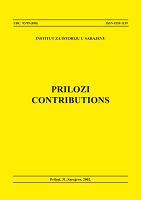Državno pravni položaj Bosne i Hercegovine u političkim koncepcijama Dr Ive Pilara (1917-1918)
The State-Legal Position of Bosnia and Herzegovina in the Political Conceptions of Dr Ivo Pilar (1917-1918)
Author(s): Zlatko MatijevićSubject(s): History
Published by: Institut za istoriju
Keywords: Bosnia and Herzegovina; State-Legal Position 1917-1918; Ivo Pilar; Austro-Hungarian Monarchy
Summary/Abstract: The state-legal split of the South Slavonic countries in the Austro-Hungarian Monarchy happened to be a permanent source of instability in the Habsburg state. Dr Ivo Pilar, lawyer, politician and geopolitician tried in the last two years of the Monarchy‘s existence, to find a satisfactory solution of the „South Slav“ question. In his oppion it should be solved in the „Croatian sense“, i.e. to unite into a state-legal body: the Croatian banate, Dalmatia, Istria and Bosnia&Hercegovina. To make a union from the formal-legal point of view, should be carried out without affecting the existing dualist system. In reality, though, it would be a rearanging the state on the threefold basis, but in a covered form („a covered trialism“). The Hungarian politicians‘ refusal to solve the „South Slav question“ out of the ruling dualist system known frame, namely their intention, Bosnia& Hercegovina, as a „corpus separatum“ to attach to the Hungarian part of the Monarchy only deepened the alredy existing deep crisis in the entire state. Being aware of the fact that the Monarchy will be disappearing, with no return, from the Middle European map, Pilar became more radical in his view of the Monarchy‘ s rearangement, proposing in the last days of the War, the Danube Monarchy to become - a federation. One of the members of the newly created federation would be the South Slav state-legal unit, consisting of the banate Croatia, Dalmatia, Istria, Bosnia&Herzegovina, but all the Slovene countries (Kranj, Steyer, Corrynthia and Gorizza). The defeat of the Austro-Hungarian Monarchy in the War and the disappearancefrom the world political scene the Pilar’s conceptions of the state-legal rearangement become nonessential. As a matter of fact all the South Slav countries of the Monarchy, with few exceptions, came to the newly established Kindom of Serbs, Croats and Slovenes.
Journal: Prilozi
- Issue Year: 2002
- Issue No: 31
- Page Range: 137-154
- Page Count: 18
- Language: Bosnian

